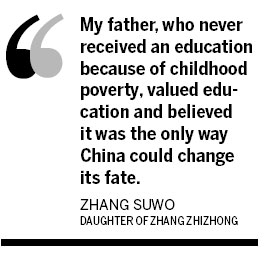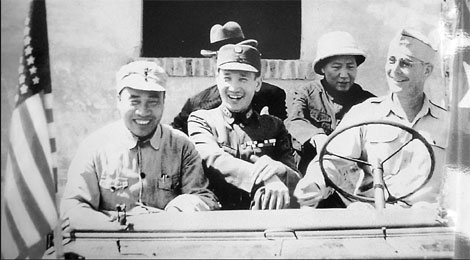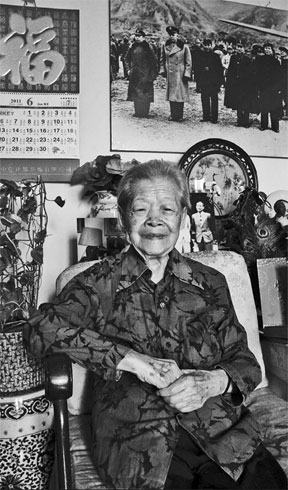General, hero, dad
Updated: 2011-11-16 07:59
By Wang Ru (China Daily)
|
|||||||||
|
A photo taken by former Chairman Mao Zedong's translator Huang Hua in 1945 features Mao (second right), Zhu De (left) and Zhang Zhizhong (middle). |
Legendary military leader Zhang Zhizhong's daughter recalls her father's exploits. Wang Ru reports.
He not only had former Chairman Mao Zedong's ear but also sometimes filled it with words the leader didn't want to hear.
"You walk too fast; I can't keep up," general Zhang Zhizhong told Mao, as he prepared to take to the Tian'anmen Rostrum to announce the dawn of the "cultural revolution" (1966-76) to thousands of Red Guards, howling, "Long live Chairman Mao!"
Zhang was trying to persuade Mao to consider the chaos the campaign might - and ultimately did - cause.
The general was among the few who could speak so directly to Mao. He had done the same with Kuomintang (KMT) leader Chiang Kai-shek, whom he served for 25 years.
There was good reason that his opinion was respected enough to be candidly conveyed.
|
Zhang Suwo, 96, lives a peaceful life in Beijing and spends her days reading English-language novels, tending to her orchids and writing books commemorating her father. Jiang Dong / China Daily |
Zhang's patriotism was viewed as impeccable. And his heroism - best displayed when he led the Chinese army to defend Shanghai against the Japanese invaders in 1932 and 1937 - is still celebrated. He proved his diplomatic savvy, too, when he negotiated between the Communist Party of China (CPC) and KMT in 1945.
He died in 1969, bewildered and disturbed by the unfolding "cultural revolution". He was 79.
His life was quite different from that of his now 96-year-old daughter, Zhang Suwo.
She has enjoyed a peaceful existence, especially since retiring after 53 years of teaching English at Beijing's University of International Business and Economics.
She spends her days in her apartment in the capital's Dongcheng district, reading English-language novels, tending to her orchids and writing books commemorating her father.
His photographs are on a table and the walls of her living room. Among them is a color photo snapped by Mao's translator Huang Hua of the historic moment her father sat on a jeep with Mao, Zhu De and US ambassador to China Patrick Hurley.
Zhang says her father hated war and spent his life fighting for peace.
That may be why he encouraged Chiang to negotiate with the CPC - against whom he never fought - badgering him to the point that Chiang once angrily shouted at him: "Am I talking to a Communist?"
The general led a peaceful life as a policeman in Jiangsu province's Yangzhou city until the second half of 1911.
That October, he picked up a newspaper and read, with astonishment, about the Wuchang Uprising. The revolt raised the curtain on the Xinhai Revolution that toppled the Qing Dynasty (1644-1911) and transformed China into a republic.
Zhang joined Sun Yat-sen's army in Shanghai the following year. He attended Baoding Military Academy and graduated in 1916.
Zhang heeded Sun's call to become an instructor at the new Whampoa Military Academy, where he met Zhou Enlai. He later joined the Northern Expedition to defeat the warlords. And he served in the fight against the Japanese.
Zhang Suwo recalls being shocked when she received a letter from her father, asking her to stop her studies at the University of Exeter in England and return to China in 1937.
She knew the situation was serious, because, "My father, who never received an education because of childhood poverty, valued education and believed it was the only way China could change its fate He said in the letter that war had broken out, and our country was facing a crucial moment."
But what this moment meant was difficult for the then 22-year-old student living in a peaceful town in England to imagine. That is, until her father, who led the 9th Army Group, rushed to the frontline of what is known as the Battle of Songhu in Shanghai. It was one of the bloodiest fights of World War II.
The Japanese had planned to seize Shanghai in three days but were demoralized by the battle that lasted three months.
Upon returning to China, Zhang taught at the primary school her father had founded. He had long insisted the family live frugally despite his high salary to save enough to build the school in his hometown in Anhui province in 1929.
 |
Zhang Zhizhong played a major role in negotiations between Mao and Chiang in 1945. Mao stayed in Zhang's home during his 45 days in Chongqing, where the two sides signed a peace deal.
"(Mao) was a polite man, who even gave his barber cigarettes," Zhang Suwo says.
Zhou Enlai persuaded Zhang Zhizhong to stay in Beijing, rather than fly to Taiwan with Chiang, when New China was founded in 1949.
Zhang Suwo says two other people influenced her, in addition to her father.
They are Chiang Kai-shek's wife, Soong May-ling, and Zhou Enlai, who protected Zhang's family during the "cultural revolution".
Zhang Suwo still has the book Soong autographed and gave her about Soong's efforts to reveal the Japanese atrocities in China and appeal for international support.
During the War of Resistance against Japanese Aggression (1937-45), Zhang joined the national women's organization Soong founded to help war refugees and orphans, and support the Chinese soldiers at the frontlines.
"She was an elegant and diligent woman. She went to the frontline to see the soldiers and boost their morale."
But her greatest source of morale today remains her father's exploits on the frontline and the legacy that has outlived him, she says.













